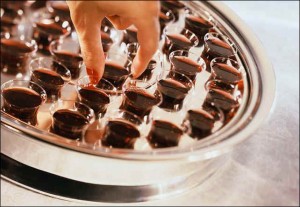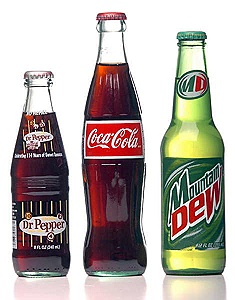I am in a denomination, like many in the US, which uses grape juice for the Lord’s Supper.
Sunday, as a communion meditation, one of our elders made the argument that in Scripture, there are a couple different words for wine. One for old wine, one for new wine and then the word(s) used for wine in the institution of the Lord’s Supper. He made the point that old wine was “the hard stuff” new wine was in transition, but the “fruit of the vine” was just the produce of the earth. It was the purest, uncorrupted grape juice–just like Jesus.
My question is, “If it really is just, “produce of the earth” or the pure “fruit of the vine,” how do we know Jesus is not talking about tomato juice?” The answer, of course, is because they didn’t drink tomato juice, they drank wine. We are committed to grape juice because it is our tradition.
From the very beginning the Church has celebrated communion with wine. It was not until the last 100 or so years that we even considered grape juice. (See this Church History by Christianity Today piece for example). In our pursuit of sterile, politically correct communion, we have left the idea of communion altogether and exchanged it for little, individual wafers and little, individual cups of juice. Sad.
I had several people Sunday ask me about the communion meditation. “Is it right?”
 What was done Sunday is typical for what has been done in churches for decades. They make detailed, logical arguments from the Greek. Who could argue with that. How about this?
What was done Sunday is typical for what has been done in churches for decades. They make detailed, logical arguments from the Greek. Who could argue with that. How about this?
In the English, we have a number of words for carbonated beverages. We say, “Pepsi” if we are talking about the sickeningly sweet drink. We say, “Coke” if we want a really well-balanced, drinkable cola. (ok, maybe that shows a bias…) But when we commune together, we pour a soda. Soda is the purest form of carbonated beverage that exists, for it is neither Coke, nor Pepsi, but it is soda.
We immediately see the foolishness of such an argument because we are very familiar with carbonated beverages. We know “soda” is a broad category which includes both Coke and Pepsi as well at Mt. Dew, Dr. Pepper and Shasta (eeeew). To say, we drank a soda, simply means we drank a carbonated beverage made of water and syrup as opposed to juice or whatever else one might carbonate.
Likewise, in the ancient world, they had a variety of words to describe wine with varying levels of specificity, but “Fruit of the vine” is not more specific, but less specific. Additionally, it completely ignores Jesus’ culture and what would be on the table at a Passover meal. The table drink was wine.
Why do we allow such silliness to be a central part of our service? If you were to speak to this elder, you would find temperance to be central to his theology about communion and about Jesus. It misses the whole point.
The point of the Eucharist is Jesus. It is His body and blood. His death. His sacrifice. To make the point of it some argument for temperance cheapens it beyond words.

You know, we are church looking again because of stuff like this. There is nothing wrong with using wine. It’s what Jesus used. His first miracle was not turning water into grape juice. Fundies are funny on things like this. They make rules where there are not any and want to ignore half of what the New Testament teaches.
One of the sad, sad things is we make rules that are not there and ignore the commands that are there.
At some point, we get confused and can’t remember what we are supposed to do and what doesn’t matter.
Some years ago, after moving to southern California, I mixed up a pitcher of Welch’s concentrated grape juice, and for some reason got distracted and left it on the kitchen counter. It was a warm day, and we had no air conditioning. It wasn’t until that evening that I noticed the pitcher still sitting on the counter. When I checked it, I noticed that the grape juice was a bit bubbly, and had a distinct bite to it! In only a few hours, in a Mediterranean climate, the sterile Welch’s grape juice had begun to ferment from the local bacteria in the air.
Having grown up in a church which believed as your elder above believes, I realized that we had a problem: in first century Palestine, with no refrigeration, and no concept of pasteurization, it was physically impossible for them to have non-fermented grape juice more than an hour or so from squeezing the grapes. And by then, the fermentation process would already have begun.
The difference between new wine and old wine is only aging – both are fermented, and the difference in alcohol content is minimal. No wine is “hard” ( i.e., liquor) unless it has been distilled (brandy) or had brandy added to it (port). Neither of these were used in Jesus’ day and locale.
American evangelicals’ antipathy to alcoholic drinks is not Biblical; it is cultural and stems from the Prohibition movement of the early 1900s. Attempts to support it from Biblical sources only show a distinct lack of understanding of Biblical culture and times.
Your last paragraph sums up the point about the Eucharist – or “communion”, as it was called in the church of my youth. It’s Christ’s body and blood, it’s his table, and how dare we draw peoples’ focus on that away with stupid arguments about non-alcoholism? After all, wasn’t Jesus’ first miracle turning water into wine?
Sorry for the long rant – but this is an issue that still bugs me!
My layman understanding is that all grapes contain the yeast to begin the fermentation. Impossible to have grape juice for long in the ancient world!
Oh this whole conversation cracks me up!
I know, I know. I was once young, foolish and horribly legalistic.
the teetotaler view doesn’t handle other cultures very well — what do they do with the larger Body of Christ? immigrants? in Europe? in Asia?
Pingback: Bread and Wine | The Wandering Shepherd